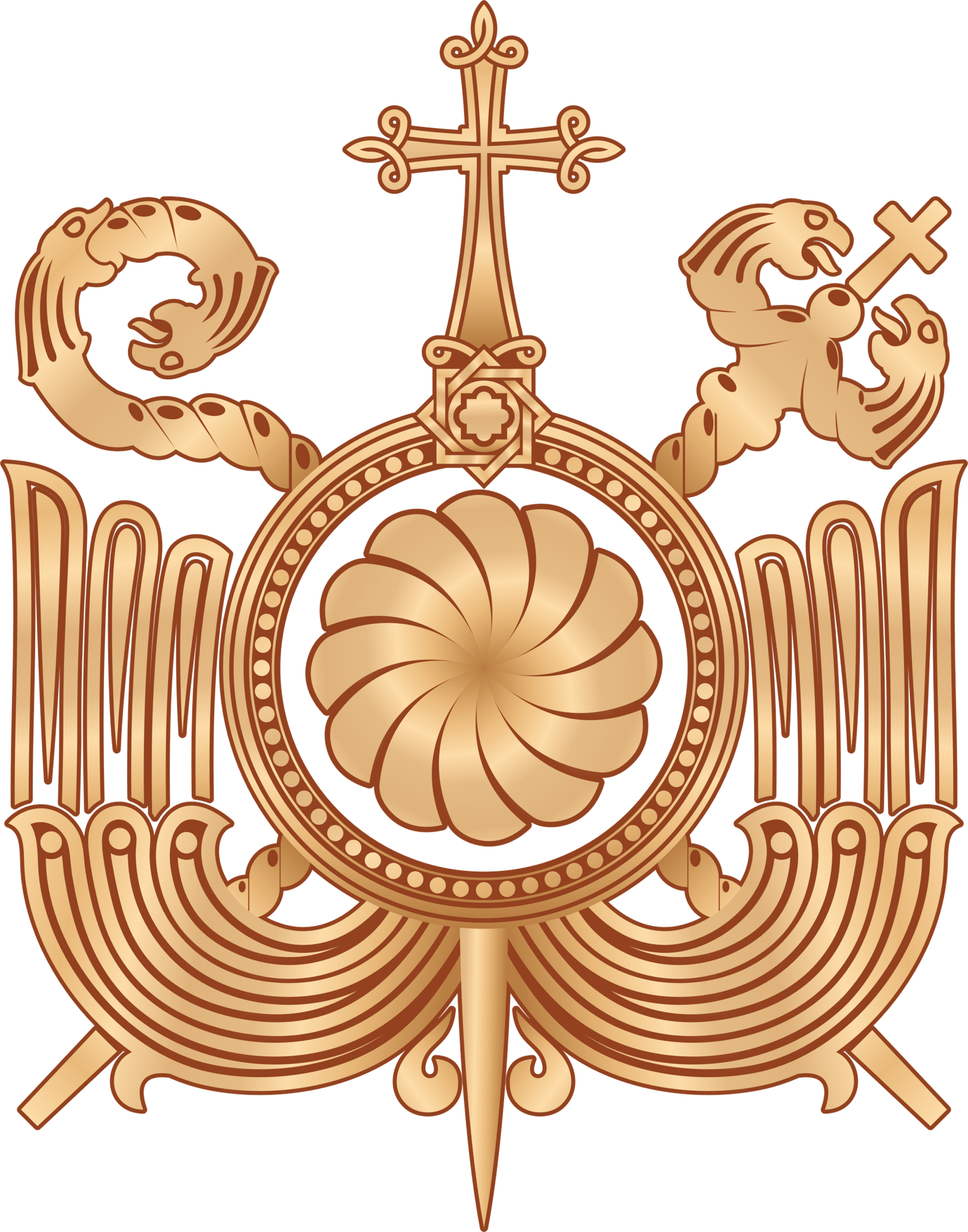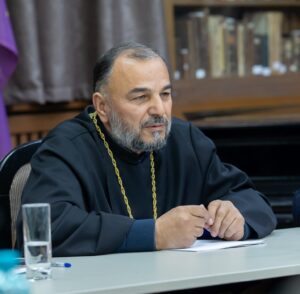The Spirit of Artsakh in the Cathedral of Bucharest
November 19 of this year was a special day at the Cathedral of the Archangels Michael and Gabriel in Bucharest. On this day, a Holy and Immortal Divine Liturgy was celebrated by His Grace Bishop Vrtanes Abrahamyan, the Primate of the Diocese of Artsakh. Bishop Vrtanes had arrived in Romania at the invitation of Bishop Tatev Hakobyan to participate in a conference organized in support of Artsakh.
After the Divine Liturgy, a memorial service was held for the heroes who sacrificed their lives defending the homeland during the Artsakh Liberation War.
Later the same day, those gathered at the "Victoria and Joseph Dudian" Armenian Cultural House Library in the churchyard had the opportunity to hear from Bishop Vrtanes about the current situation in Artsakh. He spoke about the social conditions of the forcibly displaced Armenians from Artsakh and the challenges the Armenian nation faces today. In his remarks, the Bishop thanked the diocesan leader for his initiative and warm hospitality, as well as the Secretary of the Department of Religion, the Romanian Patriarchate, and all the supporters. Those present asked questions and received detailed answers from the Bishop.
At the end of the meeting, Inesa Tumasian, the press officer of the Armenian Diocese of Romania, interviewed His Grace Bishop Vrtanes Abrahamyan, the Primate of the Diocese of Artsakh:
– God bless you, Your Grace. Welcome to Romania. Is this your first visit here, and what are your impressions?
– God protect you. First, I must say that my knowledge of Romania dates back to the Soviet era when I was a student. I had imagined that this country was rich in nature, geography, and living conditions. I also learned about the country, the Armenian community, and important cultural values when Vazgen I became the Supreme Patriarch and Catholicos of All Armenians. During my student years, under the leadership of Vazgen I, we regularly heard wonderful stories and beautiful words about Romania. The third source from which I received information was from the late Archbishop Tigran Martikyan, who was also the Primate of the Diocese of Azerbaijan. He often visited us and shared interesting stories, especially about the monasteries and churches under the patronage of the Romanian Diocese, such as the miraculous monasteries of Hădăreni and Zamca in Suceava.
Coming back to the present, I witnessed the immense work carried out by Bishop Tatev Hakobyan. Seeing this work fills one with spiritual joy, especially given the current situation, far from our homeland. The community is small, but the work done in terms of churches, monasteries, monuments, properties, manuscripts, and cultural values, which were collected by our ancestors, is vast. Organizing and giving a proper value system to all of this is a challenging and large-scale task being carried out by the diocesan leader. This shows that this historically significant diocese still has a mission, not only in its spiritual mission but also in demographic and cultural aspects.
– After participating in the conference, what are your expectations?
– The conference itself is the result of the sacred work carried out by Bishop Tatev. In my respect for him, through his efforts, Romania has learned more about Armenia and Artsakh. He has always been in Artsakh, bringing about a spiritual revolution among the people by describing what he saw. Thanks to the Bishop, their understanding has changed.
I believe that this is the result of that great work, where the Secretary of Religion, the state apparatus, and spiritual leaders all responded to the situation in Artsakh. I believe my expectations have already been fulfilled. This gathering means that people are sincere, like-minded, and understand what Artsakh is and what has happened there. What we presented is secondary because the primary explanation came from Bishop Tatev, and they came prepared.
– Your Grace, the Mother See of Holy Etchmiadzin maintained your position, but the Republics of Armenia and Artsakh did not maintain Artsakh. How do you feel about that?
– I am hopeful that the government of the Republic of Armenia will have the courage and wisdom to maintain the Republic of Artsakh.
– In one of your statements, you mentioned that you wish to celebrate the Divine Liturgy at least once a month in one of the churches of Artsakh. Do you think that is possible, and what are your plans for this?
– Yes, it is possible. We must work with international organizations to ensure the safe pilgrimage of our people to Artsakh. We expect international organizations not only to protect our cultural and historical monuments but also to allow us to visit our historic monasteries and cemeteries as pilgrims.
– Your Grace, do you think that these territorial, and other losses will help the Armenian nation to become more sober and appreciate and protect what we have left now?
– How many times must a nation suffer genocide before it forms a national self-preservation plan? How many wars must we go through to understand how to organize our defense? Today, we do not even have sufficient basic defense structures, such as shelters. I hope this will be the last time so that we can wake up as a nation, unite, and not only ensure the safety of Armenia’s current territory but also reclaim our occupied lands.
– What data do you have about the forcibly displaced Armenians from Artsakh, and what steps are being taken to meet their social needs?
– The majority of forcibly displaced Armenians from Artsakh have sought refuge in Armenia, settling in various regions. Very few have migrated to the Russian Federation. The Church, the state, public organizations, and individuals are all offering assistance to the displaced Armenians through various programs. Of course, it is impossible to fully organize or compensate for what they left behind in Artsakh.
– Your Grace, let’s conclude by continuing with the topic: how can we ensure that the Armenians of Artsakh settle in Armenia rather than abroad? What important steps should we focus on and start taking?
– This is indeed a difficult question. First, we must provide housing, employment, and secure areas for the Armenians of Artsakh. The preservation of the Republic of Artsakh and its diocese is the pillar on which the Armenians of Artsakh will preserve their identity, and in the moment of political will, they will be ready for a victorious return.




